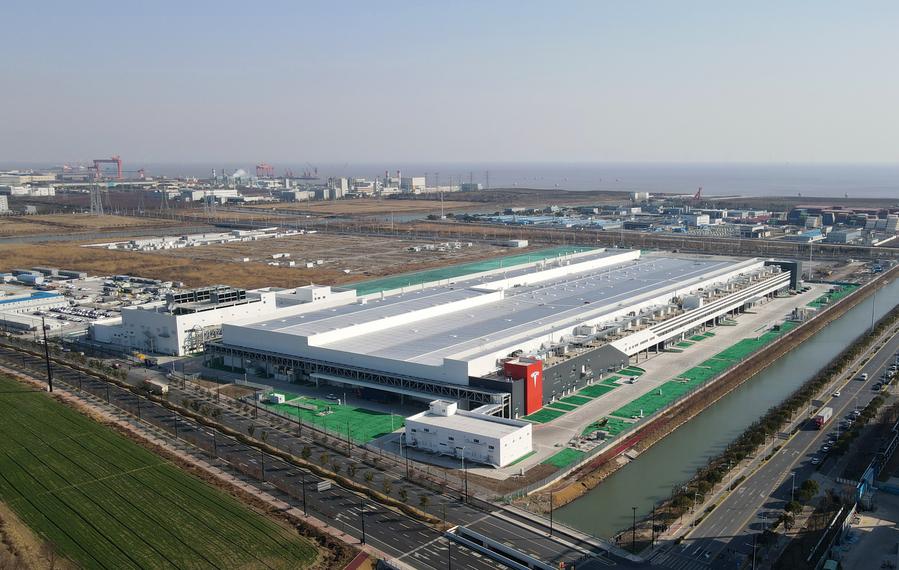Why U.S. companies remain bullish on Chinese market

An aerial drone photo shows U.S. carmaker Tesla's Megafactory in Shanghai, east China, Feb. 8, 2025. (Xinhua/Fang Zhe)
Rajesh Subramaniam, chair of the U.S.-China Business Council (USCBC) Board of Directors, recently led a delegation to visit China, signaling American business community's support for China-U.S. economic and trade dialogue and creating favorable conditions for healthy industrial, economic and trade cooperation between the two countries.
Despite looming U.S. tariff threats, American companies remain optimistic about the Chinese market—a valuable stance that reflects China's irreplaceable appeal of certainty brought by the country's development.
This certainty stems first from China's steady development. In the first half of 2025, the Chinese economy expanded by 5.3 percent. China's gross domestic product (GDP) is expected to reach about 140 trillion yuan ($19.49 trillion). The country's contribution to world economic growth has stayed at around 30 percent over the years, becoming a key driving force for global economic growth.
This is made possible through China's consistent policies: the scientific formulation and consistent implementation of five-year plans, and pragmatic and targeted macroeconomic policies, which have outlined a clear and predictable development blueprint, giving enterprises stable expectations and strong resilience to navigate various developmental challenges.
This certainty also derives from China's unwavering commitment to opening its doors ever wider. China is taking concrete steps to create new opportunities for global enterprises, including American companies. For instance, the country is accelerating the opening-up of its service sector, including 155 pilot tasks in various areas.
Delegation members of the USCBC Board of Directors noted that China's clear signals of continued high-level opening up to the outside world are crucial for foreign companies, including American firms, seeking to invest and operate in the country.
This certainty also lies in the tremendous potential of China's super-large market. As the world's second largest consumer market, China boasts the world's biggest middle-income group.
The country's consumption upgrade is well underway. Per capita service consumption expenditure in 2024 among Chinese residents accounted for 46.1 percent of the country's total per capita consumption expenditures. Compared with developed countries, where service consumption typically accounts for more than 50 percent of total consumption once per capita GDP surpasses $10,000, the growth potential of the Chinese market is promising. This also opens up a broader new horizon for foreign companies to weave themselves into the fabric of the Chinese market.
Deep engagement in the Chinese market has become a strategic pivot for multinational corporations to consolidate their global market share, achieve economies of scale, and drive technological advancement.
This certainty is equally rooted in China's strong innovation momentum. From the global popularity of Chinese artificial intelligence (AI) app DeepSeek to technological advances of Chinese robotics firm Unitree Technology, China is at a crucial juncture for scientific and technological innovation.
In the accelerating wave of green, digital, and intelligent transformation, China has become the best testing ground for the new round of scientific and technological revolution by leveraging its full-fledged industrial system. Its continuous exploration in emerging fields such as biomanufacturing, quantum technology, and embodied intelligence will undoubtedly create broader development opportunities for foreign investment.
The latest USCBC report reveals that 82 percent of surveyed U.S. companies reported profitable operations in China, definitively debunking the claim that the U.S. is "losing."
According to the U.S. Department of Commerce, from 2001 to 2023, the U.S. annual service trade surplus with China expanded 11.5 times to $26.57 billion. Meanwhile, in 2022, the sales revenue of the U.S.-owned enterprises in China reached $490.52 billion, six times greater than sales revenue generated by Chinese-owned enterprises in the U.S.
History has repeatedly shown that politicizing economic and trade issues and coercing businesses into taking sides not only defies economic laws, it also harms the fundamental interests of both countries. When China and the U.S. cooperate, they will benefit; when they confront each other, both will suffer. China—a land of certainty and opportunity—remains open to all enterprises that embrace the belief in win-win cooperation. Only by steadfastly pursuing the path of openness and cooperation can we nurture a thriving future for both nations and the world at large.
Photos
Related Stories
- China continues to suspend or removes export-control measures on some U.S. entities: ministry
- China adjusts unreliable entity list measures on certain U.S. firms: ministry
- Full text: Joint Statement on China-U.S. Economic and Trade Meeting in Stockholm
- China opposes U.S. politicizing, weaponizing tech, trade issues: FM spokesperson
- China-US trade ties crucial for global growth
- Building mutual trust, deepening dialogue, striving for win-win outcomes
- Across China: 80 years on, U.S. youth carry the Flying Tigers' torch
- Improved Sino-US biz ties welcomed
- China seeks to deepen dialogue, consultations with U.S.
- Commentary: Dialogue and mutual benefit key to long-term stability in China-U.S. trade ties
Copyright © 2025 People's Daily Online. All Rights Reserved.









